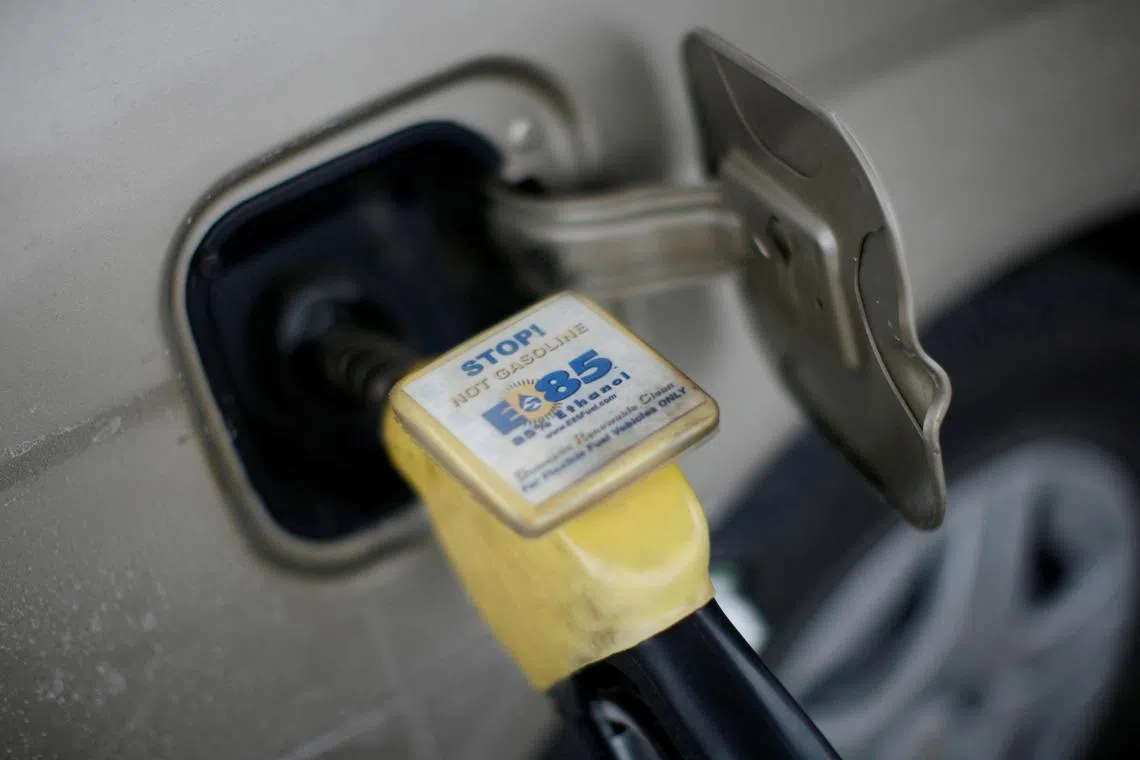Biden’s biodiesel quotas deal blow to plant-based fuel makers
Sign up now: Get ST's newsletters delivered to your inbox

The EPA will require a record amount of renewable fuel to be mixed into gasoline and diesel over the next three years.
PHOTO: REUTERS
WASHINGTON – The Biden administration handed a setback to makers of bio and renewable diesel with federal quotas for the fat-based fuel that advocates say ignore a surge in production and a wave of investment in new manufacturing plants.
Under a regulation set to be finalised on Wednesday, the Environmental Protection Agency (EPA) in 2023 will require the use of 10.7 billion litres of biomass-based diesel, generally made from soybean and canola oil – an increase from the 10.4 billion litres mandated in 2022.
For 2024 and 2025, the quotas are being set at 11.5 billion litres and 12.7 billion litres, respectively.
Overall, the EPA will require a record amount of renewable fuel to be mixed into gasoline and diesel over the next three years – up to 84.5 billion litres in 2025.
The quotas, governing how much renewable fuels must be blended into United States petrol and diesel supplies, were detailed by people familiar with the matter who asked not to be named before a formal announcement.
The biomass-based requirements are well below the increase sought by producers, who warned the White House that recent surges in US production warrant much higher targets and that multi-billion-dollar investments in renewable diesel capacity hang in the balance.
The EPA failed to fully consider data “demonstrating an upward trajectory for biodiesel, renewable diesel and sustainable fats and oils”, Mr Kurt Kovarik, vice-president of federal affairs for the Clean Fuels Alliance America, said in response to the reported targets.
The closely watched quotas have long been a source of tension for Republican and Democratic presidents as they seek to balance oft-competing oil refining and agricultural interests.
President Joe Biden campaigned on promises to promote corn-based ethanol, but his administration has put muscle into a push for electric vehicles that could limit the market for all liquid fuels, whether made from plants or petroleum.
On Tuesday, the quotas were uniting a range of stakeholders – including biodiesel and ethanol producers, rural farm interests and oil refiners – in opposition.
The EPA is also limiting the amount of conventional ethanol that could be used to fulfil quotas in 2024 and 2025 to 56.8 billion litres each of those years – a reduction from the 57.7 billion litres target it had proposed earlier and a defeat for makers of the corn-based fuel.
“If the reports are accurate, EPA’s decision to lower its ambitions for conventional biofuels runs counter to the direction set by Congress and will needlessly slow progress toward this administration’s climate goals,” said Ms Emily Skor, chief executive officer of the Growth Energy ethanol advocacy group.
Representatives of the EPA did not respond to requests for comment.
News of the EPA’s move began rippling through markets on Tuesday, coinciding with stock declines at biofuel producers and firms that deal in crops used to make the products.
Darling Ingredients, which through its Diamond Green Diesel partnership with Valero Energy is the top US producer of renewable diesel, tumbled as much as 8.1 per cent, the stock’s biggest intra-day decline in more than three months.
Valero fell as much as 3.4 per cent, while ethanol maker Green Plains pulled back 3.2 per cent. Agriculture behemoths Archer-Daniels-Midland Company and Bunge also retreated.
US Representative Zach Nunn, a Republican from corn- and soybean-rich Iowa, called the reported requirements “woefully inadequate compared to production potential, failing to support farmers, protect our environment or keep up with demand”.
Some refiners argued the ethanol requirements were still too high.
Mr Chet Thompson, president of the American Fuel and Petrochemical Manufacturers Association, said in response to reports of the quotas that the EPA is failing to take advantage of its flexibility under federal law to modernise the Renewable Fuel Standard programme and provide greater climate benefits.
“Setting unachievable conventional biofuel targets is a missed opportunity,” he said.
The EPA already jettisoned a controversial proposal to expand the Renewable Fuel Standard programme to reward automakers for some electric vehicle charging, though officials have said they plan to advance the initiative separately.
The quotas also have taken on a new dimension for US renewable diesel producers, whose margins increasingly depend on the price of tradeable credits that refiners and fuel importers use to prove they have fulfilled the annual biofuel-blending requirements.
The US renewable diesel industry’s benchmark margins in 2023 are 3 per cent above five-year averages of US$2.27 a gallon (3.8 litres), in large part because of an increase in the price of those tradeable compliance credits, known as renewable identification numbers, Bloomberg Intelligence analyst Brett Gibbs said.
Producers in 2023 are receiving US$2.86 a gallon for renewable identification numbers tracking biodiesel, up from an average of US$1.63 from 2018 to 2022.
Still, some analysts said the renewable diesel industry still has plenty of room to grow.
There is “ample room” for excess biomass-based diesel production to be absorbed under the reported quotas for advanced biofuel and total renewable fuels, said Mr Josh Price, director of the energy team at Capstone LLC.
That mitigates risk for producers, he added. BLOOMBERG


